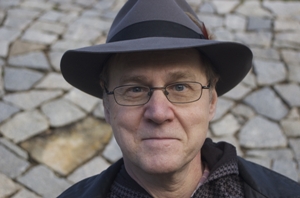Q&A with Chris Carlton Brown
 photo credit: Lindsay Marks
photo credit: Lindsay Marks
You’ve made the setting of the book come alive so vividly. Is the atmosphere inspired by a place you know?
Hoppergrass is not a memoir in any sense, but the Hill was inspired by a real place.
When I was a teenager, I went through a rough patch and got dangerously involved with drugs. At fifteen, I spent time in a Virginia reform school. In later years, I kept the memories of that place to myself. I didn’t want others, especially those close to me, to know that part of my life. Strangely, not talking about the memories etched them in deeper and made me feel that I had to describe them.
Is Bowser’s character inspired by a real person? Or by your own experience as an adolescent?
Bowser does not represent any real person, and particularly not me. He is probably better than me in some ways and worse in others. His character was formed from the clay of my experience as a teenage boy, but he changed and developed as he was shaped by the other characters and events in the story. I didn’t really know who he was when I started writing in his voice, but now I feel I know him pretty well.
It must have been fun to think of such colorful nicknames for all of the characters in the book. How did you come up with them?
“Bowser” occurred to me from nowhere. I liked the way the name became a handle that people grabbed onto as soon as they met him. I liked the way other characters would say, “You’ve got the name of a dog.” Later in the story I got to recount how he got the name, and how his peers collectively morphed it from “Grover” to “Rover” to “Bowser”. That kind of group free association struck me as the way boys really do come up with nicknames. Most of the other nicknames I’ve actually heard before: Shorty Nub, Snicklesnort, Baby Bird, Nose; I’ve heard someone called by every one of those nicknames. The boys I hung out with, in and out of the reform school, were often very good story tellers and they were great at capturing someone’s essence in a nickname. It was fun remembering the names and attaching them to new characters.
Tell us about your own experiences with troubled teens. How did they help to shape the story?
I worked with teens as a volunteer teacher at a psychiatric facility. Since then, I’ve taught learning disabled teens in various settings. This year I’m teaching learning disabled kids in a Richmond City public school. Reading, writing, and talking with these kids immersed me again in teen voices, and I learned again that the most troubled and troublesome kids can offer glimpses of brilliance and depth of heart.
You’ve had a broad ranging professional life, including a business career in East Asia. How did you go from there to becoming a teacher and a writer?
When I was a teen, a book I read by Alan Watts convinced me that learning Chinese would open a window into another way of thinking and seeing. I thought it would make me a better writer. After graduating from high school, I worked a variety of jobs in Virginia: construction labor, sales, farm work. I even worked as a roustabout for a traveling carnival for a little while. Since I had always loved writing, I started taking night English classes at Virginia Commonwealth University while working as a construction laborer during the day. After I was disabled in a motorcycle accident, I started going to college full time and was able to transfer to Georgetown University on a scholarship. I majored in English and took most of my electives in Chinese. After graduating from Georgetown, Phi Beta Kappa, I moved to Taiwan to study Chinese and teach English.
Around that time, the U.S. normalized diplomatic relations with China. I returned to the U.S. and worked as a journalist covering business and China, and before long I was posted to Beijing as the director of China operations for the U.S.-China Business Council. That was the beginning of my career as a business development executive for U.S. companies. I lived with my family in Beijing for 7 years, and was in Beijing during the Tiananmen Square Massacre. While in Beijing, I wrote poetry, some of which was published in Chinese in a dissident journal, and wrote my own journals and fiction sketches. After working for a few years as an executive in the U.S., my family and I moved to Shanghai, where I set up a software company.
After that gig, I started to approach my life from a new direction. I had always felt that I write better than I do anything else, and I didn’t want to hedge my time anymore. While writing Hoppergrass, I returned to college to work on a master’s degree in special education. Both writing Hoppergrass and teaching at risk teens, I think, offered me ways to try to make something good out of the mess I’d made and lived through as a boy.
What are you reading right now?
I’m reading Bud not Buddy by Christopher Paul Curtis with one of my classes. On my own time, I am reading The Fiend in Human by John MacLauchlan Gray. I also like to read The New Yorker magazine every evening.
